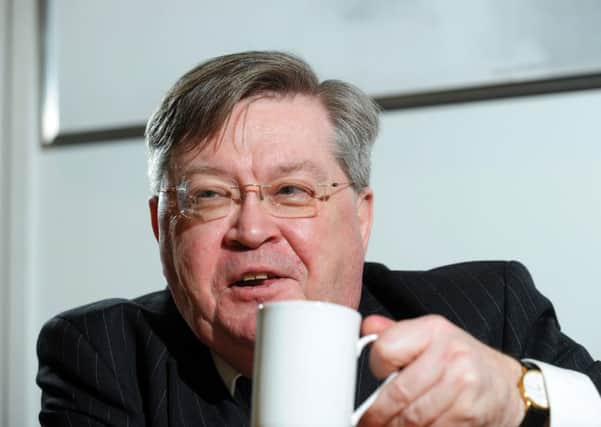Differences appear among the majority at Threadneedle Street


Minutes of the Monetary Policy Committee’s November 5-6 meeting showed its members voted 7-2 for the fourth month in a row to maintain rates at their record low 0.5 per cent, where they have been since early 2009 when the financial crisis was raging.
But there was a “material spread of views” among the majority, the minutes said, sending sterling up against the dollar and gilt prices lower.
Advertisement
Hide AdAdvertisement
Hide AdSome of the seven thought there was a risk that economic growth and inflation might undershoot forecasts and leave the economy vulnerable to shocks if rates rose too soon.
But others emphasised a risk that spare capacity could be used up more quickly than the Bank’s latest forecasts show.
“Individual members ascribed materially different probabilities to these risks,” the minutes said.
The tone of the report suggested some policymakers were less sure of the need to keep interest rates on hold going into 2015 than had seemed the case last week, when the Bank said inflation might fall below 1 per cent soon. Then, it forecast price growth would probably hit the Bank’s 2 per cent target in about three years’ time.
Advertisement
Hide AdAdvertisement
Hide AdGovernor Mark Carney suggested last week that markets were right to rule out an interest rate hike any time soon.
“Reading the runes is hard at the moment. Last week’s Inflation Report forecast was extremely dovish, but today’s minutes were less so,” said Berenberg’s UK economist Rob Wood.
“Our view is that rate hikes are off the table until after the election, but the BoE will pull the trigger in June 2015.”
Ian McCafferty and Martin Weale, who have voted for a rate hike since August, again said below-target inflation was largely the result of a stronger pound and lower raw materials prices.
Advertisement
Hide AdAdvertisement
Hide AdFigures on Tuesday showed inflation edged up to 1.3 per cent in October, still well below the Bank’s 2 per cent target.
Wage growth exceeded inflation in September but only very slightly.
Andy Haldane, chief economist at the Bank of England, said this week he is watching “like a dove” for signs that expectations of very low inflation could become entrenched.
Martin Beck, senior economic advisor to the EY ITEM Club, said the minutes struck “a surprisingly hawkish tone, highlighting a degree of disagreement even among those members voting to keep bank rate on hold”.
Advertisement
Hide AdAdvertisement
Hide Ad“However, the concerns expressed by some committee members about potential inflation pressures are overblown,” added Mr Beck.
“Recent comments by the Governor and other MPC members have emphasised risks in the opposite direction.
“Despite the widening of viewpoints among the MPC’s doves, we think that the majority in favour of keeping rates on hold won’t be disappearing anytime soon. As a result, a rate rise won’t happen until well into 2015.
“With the MPC forecasting that CPI inflation will drop below 1 per cent in the next few months and remain below the 2 per cent target for the next three years, it begs the question why the MPC isn’t taking action to loosen policy now.”
Advertisement
Hide AdAdvertisement
Hide AdCalum Bennie, savings expert at Scottish Friendly, said he did not expect a rise in interest rates any time soon.
“The fact remains that most people are still being squeezed by their household bills, and it could be some time before the economy significantly improves as constraints on consumer spending continue.
“However, anyone investing their savings needs to be mindful that current external pressures, such as the oil price, will not remain so benign forever.
“While inflation is still expected to dip to 1 per cent later this year, the environment is uncertain, so saving and investing now can help protect against sustained rises in prices.”
Advertisement
Hide AdAdvertisement
Hide AdHoward Archer, chief UK and European economist at IHS Global Insight, said there is a very real possibility that the Bank of England will delay any rises until the fourth quarter of 2015 or even early 2016.